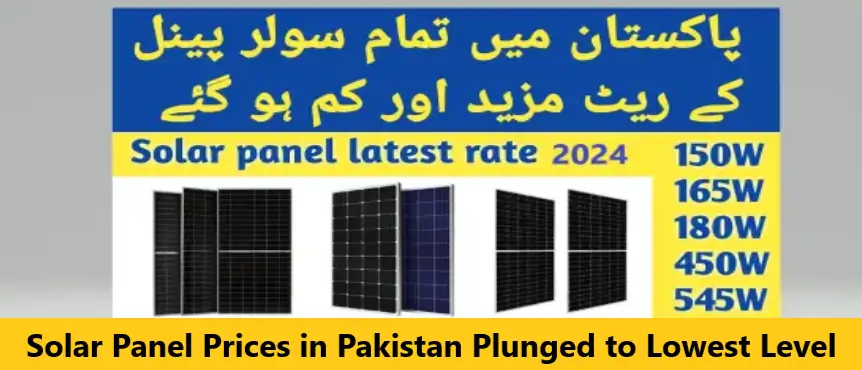Solar Panel Prices in Pakistan Plunged to Lowest Level
Overview of the Decreasing Solar Panel Prices in Pakistan
Historic Drop in Solar Panel Prices
In an unprecedented turn of events, solar panel prices in Pakistan have seen a dramatic decrease, reaching a record low of Rs. 30-32 per Watt.
Read More: Govt Ends Net Metering Fixed Charges for Solar Panels
This reduction marks a significant milestone in the renewable energy sector, making solar energy more accessible and affordable for consumers across the country.
Major Factors Contributing to the Price Drop
Several factors have contributed to this historic decline in solar panel prices:
- Excess Supply in the Market: The local market is currently flooded with an oversupply of solar panels, driving prices down.
- Global Decline in Lithium Battery Prices: Over the past 12 months, lithium battery prices have dropped by nearly 50% internationally, influencing local solar panel costs.
- Import Freedom and Tax Reductions: The easing of import restrictions and reductions in taxes have further decreased the cost of solar panels, enhancing market competition.
Price Comparison of Solar Panels
The recent drop in solar panel prices is particularly evident in the cost of various wattage panels:
- 550-Watt Solar Panel: The price has decreased from Rs. 70,000 to around Rs. 20,000, reflecting a massive Rs. 50,000 reduction.
- 450-Watt Solar Panel: Now available for approximately Rs. 20,000.
- 330-Watt Solar Panel: Priced below Rs. 15,000, making it a popular choice among consumers.
Global Influence on Local Prices
The decline in solar panel prices in Pakistan is not an isolated incident; it is part of a broader global trend. Chinese manufacturers, who dominate the global solar panel market, have ramped up production, leading to an oversupply that has driven down prices worldwide.
Warehouses in China, Europe, and America are overflowing with surplus solar panels, further contributing to the global price drop.
Impact of Price Depreciation on Solar System Costs
The drop in solar panel prices has also led to a reduction in the overall cost of solar energy systems:
- 7-Kilowatt System: Reduced by Rs. 100,000, now available for Rs. 825,000.
- 10-Kilowatt System: Price decreased to Rs. 1.125 million.
- 12-Kilowatt System: Now priced at Rs. 1.4 million, with a reduction of Rs. 200,000.
- 15-Kilowatt System: Available at Rs. 1.6 million, also reflecting a significant price drop.
These reductions stand in stark contrast to the previous month’s prices, which saw a surge of Rs. 75,000 to Rs. 300,000 due to escalating demand.
Future Price Predictions
Looking ahead, it is anticipated that solar panel prices will continue to fall over the next year, with any potential increases being minimal. Given that China is responsible for producing over 80% of the world’s solar panels, the global market dynamics will play a significant role in determining future prices.
Conclusion: Solar Panel Prices in Pakistan Plunged to Lowest Level
The significant decrease in solar panel prices in Pakistan represents a new era of opportunity, making solar energy more affordable and accessible to a broader segment of the population. With the government’s continued efforts and global market trends favoring lower prices, solar energy adoption in Pakistan is set to grow, contributing to a cleaner and more sustainable energy future.
FAQs: Solar Panel Prices in Pakistan Plunged to Lowest Level
- Will solar panels become cheaper in Pakistan?
Yes, solar panels are expected to become even more affordable in Pakistan, driven by government initiatives and global market trends. - Why are solar panel prices dropping?
Multiple factors, including excess supply, global price reductions in lithium batteries, and tax incentives, are contributing to the decrease in solar panel prices. - What is the price of solar panels in Pakistan in 2024?
Solar panel prices fluctuate daily, but the current trend suggests a continued decrease, making it an opportune time to invest in solar energy.
Note: The information above might not be accepted 100%. Please verify from your own sources. We will not be responsible/liable for any kind of loss due to our content.
For more news, please visit Munafa Marketing.




